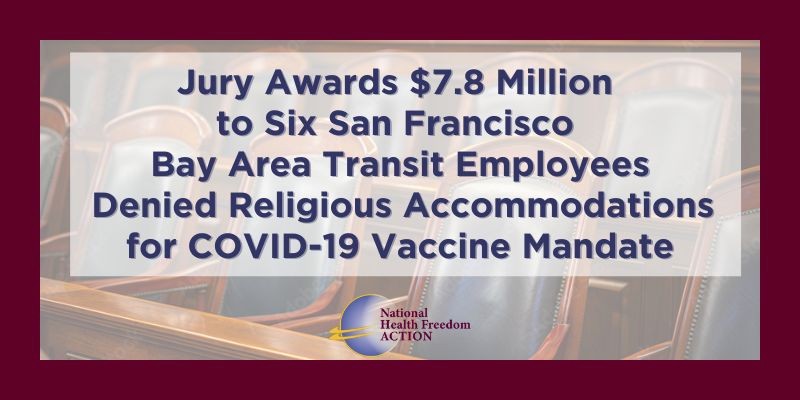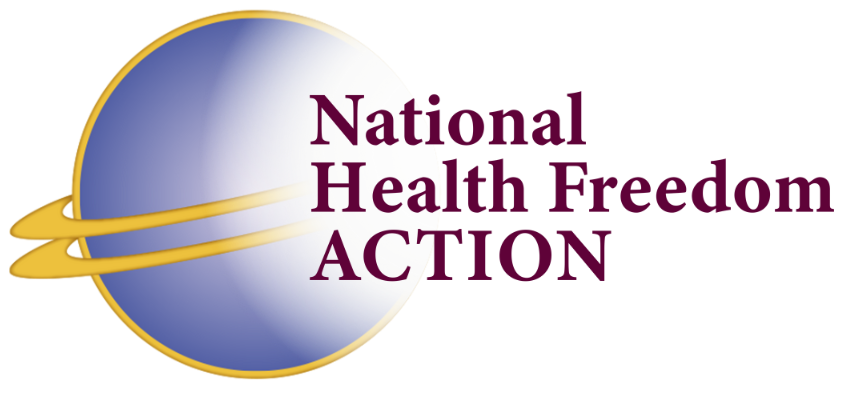

For years we have chronicled court cases that have revealed health freedom successes, and these have focused on decisions by trial judges or appeals judges, rather than cases of trial by jury. But from ancient Greece to England’s Magna Carta of 1215, to the founding of the USA, the procedure of trial by jury has been a key feature in Western legal systems.
This system allows the people to weigh in on important questions faced by individuals and society. On October 23, 2024, a federal jury in San Francisco issued a major verdict regarding what damages six Bay Area Transit employees, who were denied religious accommodation to a COVID-19 vaccine mandate, could claim. The plaintiffs, transit employees, were represented by the Pacific Justice Institute (PJI), and this nonprofit issued a press release about the successful case on October 24, 2024.
$1 million each for mental anguish
According to PJI, the verdicts were a “stunning blow” to the San Francisco Bay Area’s Rapid Transit System (BART) that had turned down every religious accommodation that was sought for its COVID-19 vaccine mandate. The jury of eight considered the evidence for two days and then unanimously awarded each of six former BART employees more than $1 million. The total award was $7.8 million, and PJI has represented these plaintiffs since 2022. On October 18 the jury had decided that BART did not prove any “undue hardship” to justify turning down the requests for religious accommodations. The new verdict decided that each plaintiff had shown “a genuine conflict between their faith and the vaccine requirement, which was implemented in late 2021.” And the jury accepted the estimates of the economic expert offered by the plaintiffs and then added an additional $1 million per plaintiff; based on reports, including one from Children’s Health Defense, this was for “mental anguish.”
Worker fired after 30 years
PJI’s President Brad Dacas offered that, “These verdicts are seismic—a 7.8 San Francisco legal earthquake. This amazing outcome represents so much hard work by our team, perseverance by these clients, and fairness from our judicial system.” And PJI’s lead trial attorney noted that, “The rail employees chose to lose their livelihood rather than deny their faith. That in itself shows the sincerity and depth of their convictions. After nearly three years of struggle, these essential workers feel they were heard and understood by the jury and are overjoyed and relieved by the verdict.” Jurors heard from each plaintiff, including one with both 30 years seniority and a “stretch of 10 years perfect attendance” before being fired. Another employee was on workers’ comp when she was terminated. While BART argued that some of the plaintiff’s objections to the vaccine were predominately secular, the federal jury disagreed. Based on media reports, BART is not commenting on the jury decision, and their website’s news section has no reference to this case.
None of religious objectors granted accommodation
According to the September 2022 Complaint in this case of Cooper et. al. v. BART, 204 employees of the defendant sought either medical or religious exemptions from its vaccine mandate. One out of three of those seeking medical exemption were granted a reasonable accommodation. Per this Complaint, “Of the 179 religious objector employees, not one received an accommodation.” The document also states both that the vaccinated can spread COVID-19 equally to the unvaccinated and that these two groups have equal “viral load.” So BART’s claims of potential dangers are not in line with current CDC data.
As stated in the Complaint:
“There is a dispute between the Plaintiffs and Defendant. BART asserts that it can undertake a detailed probe of the sincerity of the religious beliefs of its employees; this includes placing a burden on the Plaintiff s to provide an objective basis for religious convictions regarding the refusal to take the COVID-19 vaccination. Plaintiffs disagree. Because faith is intrinsically subjective, a religious objector cannot be held to an objective measure of proof regarding what lay within his or her heart, mind, and soul. Belief in what one may demonstrate to the senses is not faith.”
An inquisition?
And in light of a string of favorable federal appeals rulings about religious exemptions throughout 2024, another statement in the Complaint is particularly relevant:
“[A] standardized practice of a rigorous inquisition is an unlawful standard. The Plaintiffs’ legal position is that, although an employee’s faith may be deemed as heresy to some and incomprehensible to others, employers cannot require orthodoxy of employees according to a recognized religion or demand that employees be put to the proof of their religious beliefs.”
We don’t know if a judge would have been so willing to fully recompense the six BART workers. But in this case, the jury appears to have understood the gravity of the accommodation denials and to have delivered their verdicts accordingly.
National Health Freedom Action helps state groups that want to pass laws that protect health freedom. NHFA’s team of attorneys and advocates work with citizen groups, small and large, to provide the training, support, and tools, to help them succeed in their wish to protect health freedom.
If you have a committed group of individuals wanting to change the laws in your state, please reach out to us via email at info.nhfa@nationalhealthfreedom.org to set up an exploratory conversation. We would be happy to help in any we can. That is why we are here!
RECENT NEWS


Executive Order on Glyphosate: Safeguard or Setback?
February 26, 2026

EPA Deregulation of Clean Air and Water: does it go too far?
February 19, 2026

